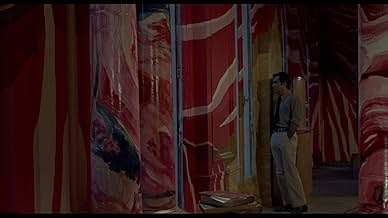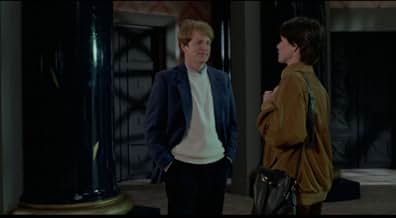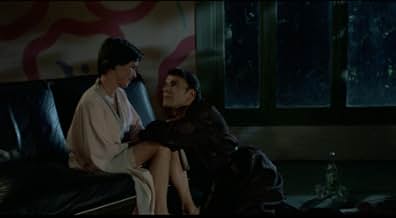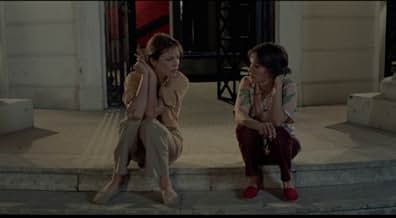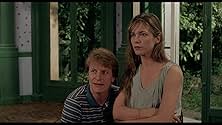Ajouter une intrigue dans votre langueA play within a play within a play within a play. Actors perform a play in a house; an audience member invites them to work in his own home improvising a play around his own life. The line b... Tout lireA play within a play within a play within a play. Actors perform a play in a house; an audience member invites them to work in his own home improvising a play around his own life. The line between fiction and reality blurs.A play within a play within a play within a play. Actors perform a play in a house; an audience member invites them to work in his own home improvising a play around his own life. The line between fiction and reality blurs.
- Prix
- 1 nomination au total
Histoire
Le saviez-vous
- AnecdotesThe film's title is a quote from Paul Verlaine.
- Autres versionsThere is also a 2 hour and 48 minute version.
- ConnexionsReferences Nashville (1975)
Commentaire en vedette
I think the reason that Rivette is the least popular -- yet by far the most secret, profound and precious -- of the New Wave directors is that he can't be pinned down to a belief. He isn't political, though corporate conspiracies are a factor in many of his films; he isn't an occultist, though his films are filled with Zodiacal symbols, the tarot, magicians; he isn't interested in putting humans under the microscope like Rohmer, though he is minutely attentive to what breaks people apart and brings them together. No; rather, politics, the occult, and humanity are like the vines tying together the raft through which he floats in the void. They are methods to generate material, curiosity and, as lit students would say, a narrative where none necessarily exists. I hope I'm making this clear -- Rivette actually LONGS FOR a worldwide political conspiracy, preferably controlled by a dark magus operating from some deceptively plain apartment in Paris, with the whole human comedy under his spell, because he knows that the alternative, what most people call "reality," would be soul death. He wants more mystery, more confusion, more action. Unlike Godard, he isn't looking for utopias, certainly not those that can be brought about by politics; he wants the world to be as it is, in all its unfathomable, malevolent, messy beauty.
As Jean-Pierre Kalfon says in L'Amour Par Terre one of Rivette's most insidious and fascinating films, by the way -- "I don't want to make life better than it is; I want life." Rivette, like many filmmakers who have disavowed their faith, has really only sublimated his religious quest. His obsession with the creative process, its false starts, abrupt detours and unknown destinations, is unmistakably of a spiritual nature. As it turns out, he is obsessed with stories because the world as we know it exists in order to contain them. For Rivette, God is not an obscure savior ( what are we being saved from? ) but a generator of fictional material, the ultimate creative artist. If the other world is defined by its permanence, its frozen perfection, this one must contain everything that can possibly exist, and the human artist, such as Rivette, then becomes like a sort of middleman between heaven and earth -- he gives form to the transitory, thus translating it for eternity.
Rivette's "strangeness" can be boiled down to his attempt to mirror God's mind by disavowing any ultimate truth. God requires stories in order not to be bored; stories require a world ruled by space and time where they can play out in a bounded setting, with a beginning and end; the world requires life in order to act out these stories. Stories, in short, require that we die. The two words that best describe Rivette's movies, "dark" and "childlike," come from the fact that, to accept that we are in a virtual, fictional realm, you must become as naive as a child for whom death is not real, yet who is subconsciously haunted by what it might mean. We die, but only because we're in a play. We die as children, but the curtain eventually rises ( he finally gives us a peek at what's behind it in his presumably final film, Marie et Julien. ) All this and more is part of why Rivette is so successful at blending the occult and the everyday there is nothing more occult than the fact that we're here at all, pretending we know what we're doing.
As Jean-Pierre Kalfon says in L'Amour Par Terre one of Rivette's most insidious and fascinating films, by the way -- "I don't want to make life better than it is; I want life." Rivette, like many filmmakers who have disavowed their faith, has really only sublimated his religious quest. His obsession with the creative process, its false starts, abrupt detours and unknown destinations, is unmistakably of a spiritual nature. As it turns out, he is obsessed with stories because the world as we know it exists in order to contain them. For Rivette, God is not an obscure savior ( what are we being saved from? ) but a generator of fictional material, the ultimate creative artist. If the other world is defined by its permanence, its frozen perfection, this one must contain everything that can possibly exist, and the human artist, such as Rivette, then becomes like a sort of middleman between heaven and earth -- he gives form to the transitory, thus translating it for eternity.
Rivette's "strangeness" can be boiled down to his attempt to mirror God's mind by disavowing any ultimate truth. God requires stories in order not to be bored; stories require a world ruled by space and time where they can play out in a bounded setting, with a beginning and end; the world requires life in order to act out these stories. Stories, in short, require that we die. The two words that best describe Rivette's movies, "dark" and "childlike," come from the fact that, to accept that we are in a virtual, fictional realm, you must become as naive as a child for whom death is not real, yet who is subconsciously haunted by what it might mean. We die, but only because we're in a play. We die as children, but the curtain eventually rises ( he finally gives us a peek at what's behind it in his presumably final film, Marie et Julien. ) All this and more is part of why Rivette is so successful at blending the occult and the everyday there is nothing more occult than the fact that we're here at all, pretending we know what we're doing.
- Delly
- 27 oct. 2005
- Lien permanent
Meilleurs choix
Connectez-vous pour évaluer et surveiller les recommandations personnalisées
- How long is Love on the Ground?Propulsé par Alexa
Détails
- Durée2 heures 5 minutes
- Mixage
Contribuer à cette page
Suggérer une modification ou ajouter du contenu manquant



